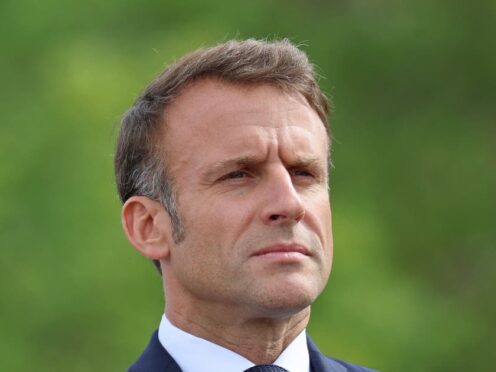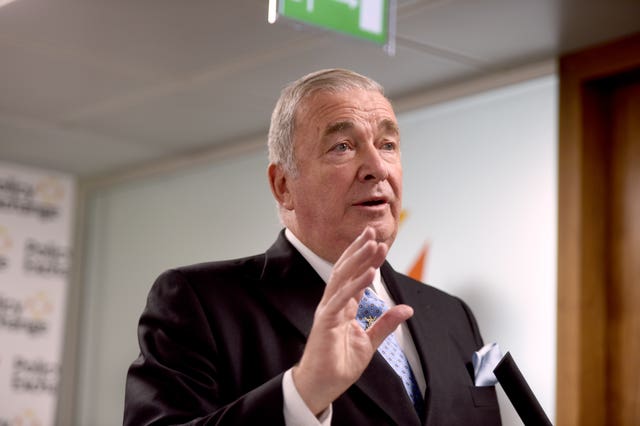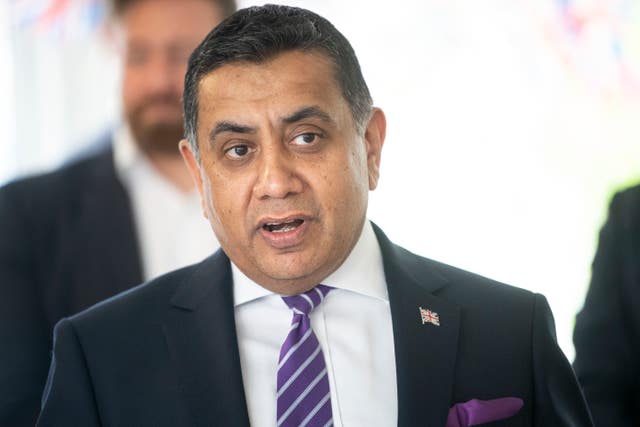
French President Emmanuel Macron has been accused of “playing little political games with nuclear weapons” by a former Royal Navy top brass.
Labour peer Lord West of Spithead argued that France should allocate its nuclear weapons to Nato, not “some half-baked EU military organisation”.
His words came after President Macron opened up the idea of France’s nuclear capability, which has always been entirely independent to military alliances, to be part of a “credible European defence”.
Lord West, a former Navy chief and then defence minister, said: “Defence of Europe is reliant on Nato, not some half-baked EU military organisation.
“That is why we are safe: because of Nato, let’s not fool ourselves.
“We allocate our nuclear weapons to Nato, which is all under the US nuclear umbrella.
“France, of course, don’t, although President Macron in 2022, 2020 as well, and now this year has floated ideas about the French nuclear weapons being allocated to some EU organisation, it’s not quite clear what yet.
“In what is now a very perilous time for our continent, with what is going on in Europe, this is not the time to play little political games about nuclear weapons, but to actually focus very carefully on what has been a nuclear umbrella that has been the underpinning of our Nato protection.
“We need to make sure in our discussions with President Macron that he understands this, but in the nicest possible way.”

Foreign Office minister Lord Ahmad of Wimbledon responded: “I assure Lord West that we are always nice to President Macron and to our friends across the Channel, but he raises a very vital point; this is a key alliance.
“And that’s why, back in 1962, the United Kingdom was very clear of its independent nuclear deterrent and its use in terms of the European security question and for support of the Nato alliance.
“We are having very constructive engagement with France on the importance of European security, particularly in the light of Russia’s illegal war on Ukraine.
“We have strong engagement at various strategic levels and at technical levels. So the cooperation is strong and we welcome also the recent statement made in the State of the Union by President Macron, in terms of both tone and substance.”
He added: “French participation in Nato’s nuclear structures is a matter for France.
“Nonetheless, we are pleased to see President Macron emphasising the European dimension to France’s deterrent.

“As the two European nuclear powers, the United Kingdom and France regularly discuss and are increasing cooperation on nuclear deterrence issues to help safeguard European security and the overall security of this important alliance.”
Former defence minister Baroness Goldie argued that the US and UK’s nuclear commitments to Nato has been “critical” in maintaining the credibility of the alliance.
The Conservative peer said: “The unambiguous commitment by the United Kingdom and the United States of their nuclear capability to Nato and the clarity of purpose governing that commitment, honoured by Nato, has actually been critical in maintaining the credibility of Nato as an effective defensive alliance.
“And we should be very vigilant in ensuring that stability is not threatened in any way.”
Meanwhile, Labour frontbencher Lord Collins of Highbury said Labour was calling for a new security pact with the EU, so “we can embrace all these issues to complement and strengthen Nato”.
Liberal Democrat peer Baroness Smith of Newnham highlighted the importance of language, and suggested that President Macron should be “a little bit careful” with regard to his comments about sending Nato troops to fight for Ukraine.
She said: “When having the conversation with the President of France, is the Government also mindful of the need perhaps, perhaps in private, to be suggesting to the President of France that we need to be a little bit careful about the use of language of ‘boots on the ground’ beyond Ukraine?”
The minister responded that he is aware of “the brilliance of our British diplomacy” and that “those very terms” are used in engagement with international partners.
On the issue of a pact with the EU, he said: “One thing we are absolutely clear on is that we want to work with key partners across Nato to ensure a strengthened alliance and that underlies through the independent deterrents that the UK brings when it comes to the issues of nuclear deterrents as well.
“It’s important we cooperate with all key partners, but Nato is the bedrock of our security alliance and that’s where the focus of the United Kingdom is.”

Enjoy the convenience of having The Sunday Post delivered as a digital ePaper straight to your smartphone, tablet or computer.
Subscribe for only £5.49 a month and enjoy all the benefits of the printed paper as a digital replica.
Subscribe